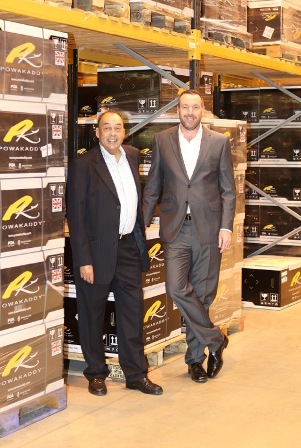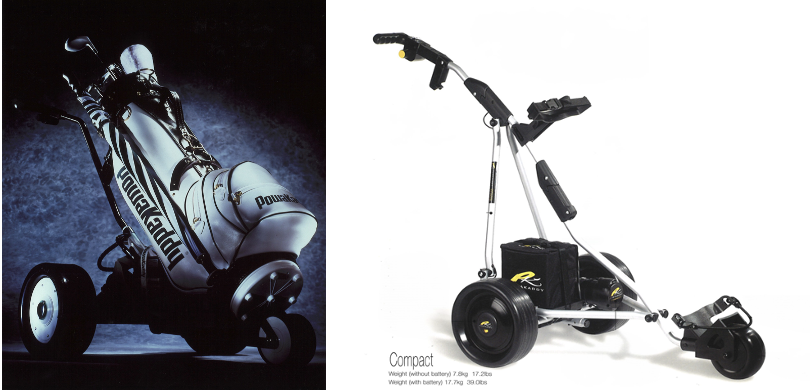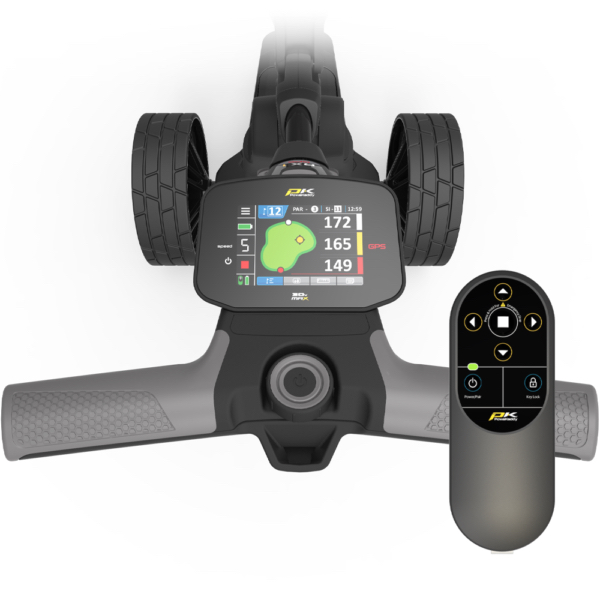PowaKaddy, pioneer of the electric golf trolley industry, is celebrating its 40th anniversary this year and is looking back on four decades of success in the golf industry, as well as continuing to drive forward golf trolley technology today and into the future.
PowaKaddy’s story started in the late 1970’s, when Joe Catford, a Kent-based watchmaker and keen golfer, used his watchmaking experience to design his own electric trolley incorporating a helical reduction gearbox, replacing inefficient chain and belt-drives. Around the turn of the new decade, Joe had honed his design to the point where he began using it whilst playing his regular rounds of golf around the Sittingbourne area – and his trolley quickly began to turn heads.
Around this time, Joe opened an automotive repair shop in Sittingbourne, which would eventually become PowaKaddy’s first headquarters. Meanwhile, Joe’s trolley continued to make waves around the local area, and he soon had a handful of friends asking for their own – he duly obliged, and, over the next few years would continue to hone his trolley design.

In 1983, Catford, along with business partner, and local entrepreneur John Martin, and son David, went to The Open Championship at Royal Birkdale with a selection of prototypes of the PowaKaddy Classic. This visit to The Open would kickstart the PowaKaddy brand into formal existence, as the team returned from the North-West with over 500 orders. These very first official orders began shipping to golf professionals and retail outlets in late 1983.
STEADY GROWTH
Over the next few years, the business grew steadily. Later in that decade, in 1988, PowaKaddy launched the Rio, which initially was released as a power-assisted pull trolley – the brand accompanied the release with a targeted ad campaign that resulted in a transformative 10,000 orders for the new trolley model.

The very same year, Catford and Martin sold the business to Sunleigh plc, and subsequently exited the business in 1989 and 1990, respectively. In 1991, Sunleigh installed John deGraft-Johnson as Managing Director, while Catford’s’s son, David, remained at the business as the brand’s leading technical and operational head.
The next decade saw the growth of the wider golf trolley industry, which included the inception of Joe Catford’s newest venture; Hill Billy – Hill Billy would serve as a close competitor to PowaKaddy through the late 1990’s, in no small part due to Joe’s influence. 1999 brought the release of the first iteration of PowaKaddy’s popular Freeway range, which quickly became the leading trolley range in the UK.
In 2000, PowaKaddy was purchased by a team led by deGraft-Johnson, and simultaneously purchased the Hill Billy brand from David and his brother Chris, bringing the two companies together under one roof. The brand would win a number of industry awards during this time period, and in 2001, the company introduced the pioneering RoboKaddy – the brand’s first remote-controlled golf trolley.
In 2005, shortly after deGraft-Johnson had moved on from PowaKaddy, the PowaKaddy Group is formed, under private equity firm Graphite Capital.
CHANGE OF OWNERSHIP
Following a turbulent and inconsistent six-year period, in 2012, David Catford and now business partner deGraft-Johnson bought the PowaKaddy brand – in turn sparking PowaKaddy’s return to the forefront of the electric trolley industry.
Under new leadership, PowaKaddy launched the Freeway range of electric trolleys in 2013 – incorporating the unique PowaFrame chassis into every new model, and later introduced the revolutionary Plug ‘n’ Play battery connection technology in early 2014.

The next decade would see a seismic shift in the management structure of PowaKaddy, as Catford and deGraft-Johnson looked to future-proof the company – rewarding loyalty to those integral to the initial success of the business primarily, and more recently investing in a number of senior management and engineering staff that have been brought on to take the business to the next level over the coming years.
PowaKaddy would continue to break new ground in product innovation in the late 2010s with the launch of the ultra-compact C2 trolley in April 2017 – the brand’s smallest folding trolley ever – and the FW7s GPS, the world’s first electric trolley with integrated GPS, in July 2017 – this new GPS integration allowed users to incorporate the entire GPS experience into the trolley handle, removing the need for secondary GPS devices or mobile phone apps for the first time.
TOUCHSCREEN TECHNOLOGY
This decade, PowaKaddy has further cemented its position as the world’s leading trolley brand. The brand launched the FX and CT ranges in March 2020, followed more recently by the release of the flagship CT8 GPS in March 2022, and the ground-breaking RX1 GPS, the world’s first touchscreen remote-controlled GPS trolley, in February 2023.

Catford expressed his pride and gratitude on this momentous occasion: “Everyone at PowaKaddy is delighted to be celebrating our 40th anniversary in 2023. To still be at the forefront of the golf trolley industry after four decades is a tremendous achievement and is testament to the hard work and dedication of our fantastic staff over the years. Moreover, we could not have achieved the successes of the last 40 years without the unwavering support of our partners, customers, and of course every single consumer that has bought a PowaKaddy trolley.”
To check out the company’s latest range of trolleys and accessories, visit www.powakaddy.com.
The post PowaKaddy celebrates 40 years of keeping golfers and their clubs on the move! appeared first on Golf News.
Leave a comment